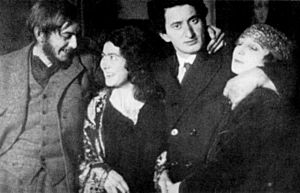Roy Campbell (poet) facts for kids
Quick facts for kids
Roy Campbell
|
|
|---|---|

(Left to right) Roy Campbell, Mary Campbell, Jacob Kramer, and Dolores, 1920s
|
|
| Born | Ignatius Royston Dunnachie Campbell 2 October 1901 Durban, Colony of Natal, British Empire (present-day South Africa) |
| Died | 23 April 1957 (aged 55) Setúbal, Portugal |
| Occupation | Poet, journalist |
| Genre | Poetry |
| Literary movement | English romantic revival, satire |
| Notable works | The Flaming Terrapin, Adamastor, Flowering Reeds |
| Notable awards | Foyle Prize |
| Spouse | Mary Margaret Garman |
Ignatius Royston Dunnachie Campbell, better known as Roy Campbell (2 October 1901 – 23 April 1957), was a South African poet, literary critic, literary translator, war poet, and satirist.
Born into a White South African family of Scottish descent in Durban, Colony of Natal, Campbell was sent to England to attend Oxford University. Instead, Campbell drifted into London's literary bohemia. Following his marriage to bohemian Mary Garman, Campbell wrote the well-received poem The Flaming Terrapin which brought the Campbells into the highest circles of British literature.
After supporting racial equality during a stay in South Africa as editor of the literary magazine Voorslag, Campbell returned to England and became involved with the Bloomsbury Group. Campbell ultimately decided that the Bloomsbury Group was snobbish, nihilistic, and anti-Christian. Campbell lampooned them in a mock-epic poem called The Georgiad, which damaged Campbell's reputation in literary circles. Campbell's subsequent conversion to Roman Catholicism in Spain and vocal support for Francisco Franco and the Nationalists caused him to be labelled a fascist by influential left-wing literati, further damaging his reputation as a poet. Campbell served in the British Army during Second World War. He briefly attended meetings of The Inklings during this period and befriended C. S. Lewis and J. R. R. Tolkien.
In the post-war period, Campbell continued to write and translate poetry and lecture. He also joined other White South African writers and intellectuals, including Laurens van der Post, Alan Paton, and Uys Krige, in denouncing apartheid in South Africa. Campbell died in a car accident in Portugal on Easter Monday, 1957.
Though Campbell was considered by T. S. Eliot, Dylan Thomas, and Edith Sitwell to have been one of the best poets of the period between the First and Second World Wars, the accusation that he was a fascist, which was first promulgated during the 1930s, continues to seriously damage his reception, though some critics have attempted to rehabilitate his reputation.
Contents
Literary style
Much of Campbell's verse was satirical and written in heroic couplets, a form otherwise rare in 20th-century English verse. Rhymed verse was generally his favoured medium.
Edith Sitwell wrote: "Roy Campbell was one of the very few great poets of our time. His poems are of great stature, and have a giant's strength and power of movement. They have, too, an extraordinary sensuous beauty. Everything is transformed to greatness."
Legacy
Campbell's satirical poetry mocking the Marxism, Nihilism and narcissism of the British intelligentsia caused him to be a very controversial figure throughout the English-speaking world during and long after his lifetime.
Furthermore, Campbell's similar attacks of what he saw as the racism of White South Africans made Campbell an equally controversial figure in South Africa under Apartheid.
In his 1982 book, The Adversary Within: Dissident Writers in Afrikaans, anti-apartheid South African author Jack Cope praised "the Voorslag Affair", as "one of the most significant moral and intellectual revolts in the country's literary history."
Furthermore, through his friendship and mentorship of Afrikaner poet Uys Krige, Roy Campbell's legacy also includes an enormous influence over the subsequent development of Afrikaans literature. Also according to Jack Cope, Uys Krige's linguistic and literary talents, his passion for French, Spanish, Italian, and Portuguese literature, and having absorbed the literary translation philosophy of Roy Campbell made Krige the greatest translator of poetry from Romance languages into Afrikaans during the 20th century. In addition to his acclaimed translations of both European and Latin American poetry, Uys Krige also translated many of the works of William Shakespeare into Afrikaans from Elizabethan English.
Furthermore, Krige would also go on to become a literary and political mentor to the many young Afrikaans language poets and writers of the literary movement known as the Sestigers. Due in large part to Krige's influence, membership in the Afrikaner intelligentsia in South Africa under Apartheid became synonymous with opposition to the South African Government.
Furthermore, Campbell may be credited with bringing the traditions of mock epics and satirical poetry in heroic couplets from the lifetimes of John Dryden and Alexander Pope into the 20th century and with updating both traditions accordingly. In this regard, Campbell continues to have followers, particularly in the literary movement within American poetry known as New Formalism.
Selected works
- The Flaming Terrapin (1924)
- Voorslag (1926–1927), a monthly magazine edited by Roy Campbell, et al.
- The Wayzgoose: A South African Satire (1928)
- Adamastor (1930)
- Poems (1930)
- The Gum Trees (1931)
- The Georgiad – A Satirical Fantasy in Verse (1931)
- Taurine Provence (1932)
- Pomegranates (1932)
- Burns (1932)
- Flowering Reeds (1933)
- Broken Record (1934)
- Mithraic Emblems (1936)
- Flowering Rifle: A Poem from the Battlefield of Spain (1936)
- Sons of the mistral (1938)
- Talking Bronco (1946)
- Poems of Baudelaire: A Translation of Les Fleurs du Mal (1946)
- Light on a Dark Horse: An Autobiography (1952)
- Lorca (1952)
- Cousin Bazilio by José Maria de Eça de Queiroz (Trans. 1953)
- The Mamba's Precipice (1953) (Children's story)
- Nativity (1954)
- Portugal (1957)
- Wyndham Lewis (1985)
See also
 In Spanish: Roy Campbell para niños
In Spanish: Roy Campbell para niños

